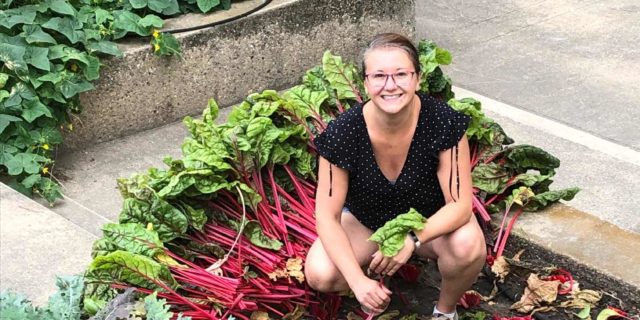
By
Serena Petrella and Suyoko Tsukamoto
November 2016
Print Version
What you need to know
Community Gardens help fight food insecurity in times of economic precariousness and retraction of social supports. Community gardening is a family affair, bonding generations to one another, and a collective strategy for community building and integration. Community gardens boost physical health and mental well-being, neighborhood renewal and safety, while also encouraging “ecological citizenship” and sustainable food production.
Why this research is important
Food insecurity is a harsh reality in Canadian households. The 2012 Household Food Insecurity in Canada Report indicated that 2% of Manitobans suffered severe food insecurity, 6.5% moderate, and 3.7% marginal; a total of 55,500 families faced hardship, 66.9% of which were on social assistance. It is important to understand the role that Community Gardens have in mitigating food insecurity in times of economic precariousness and governmental retraction of social supports and services. Community gardening helps families round up their food budget and ensures that nutritious fresh produce reaches the table; it can be an important collective strategy for community building that fosters integration and cohesion. Community gardens boost physical health and mental well-being, neighborhood renewal and safety, while also encouraging ‘ecological citizenship’ and sustainable food production. It is important to study community gardening to ensure its beneficial effects are maximized, and to identify and eliminate any barriers that people making use of these collective spaces face.
How the research was conducted
Researchers surveyed gardeners in fifteen community gardens in Brandon. Questions were designed to test three hypotheses: (1) Are gardeners actively trying to reduce food insecurity through gardening? (2) Does community gardening boost community building and social integration? (3) Does it help strengthen familial bonds? While in the field, the researchers discovered that paper surveys were not an ideal method to gather information. Gardeners were busy planting and cultivating, and given the social nature of the space, they much preferred to talk to the researchers. The surveying system organically evolved into a face-to-face interview format.
What the researchers found
The researchers’ three hypotheses were supported by the findings. Community gardening is a strategy used to boost food security: most gardeners reported that they wished to bring affordable fresh produce to their table; about half stated it helped subsidize the family budget. We found that community gardening fights social marginalization—it cultivates resilience through collective work, alleviates dependency, and fosters self-determination in economically precarious times. Gardens are communal spaces shared by people of all ages, who are culturally and ethnically diverse; long time members of the community and newcomers are able to socialize with one another. Gardeners are socially and environmentally mindful: gardening gives them the occasion to engage with their community and celebrate their cultural identity by using growing techniques from home. Spontaneous forms of monitoring and supervision arise, which can help mitigate crime, and are particularly beneficial to youth in low-income environments. Gardening helps to forge stronger family bonds—it is very much a “family thing”, where family members collaborate both intra-generationally and inter-generationally. Some problems and limitations were identified: a long waiting period to secure a garden space and a plot allocation far from home were the most common complaints. This finding indicates that more community gardens are needed, and more land should be allocated for this purpose, especially in low-income neighborhoods.
How this research can be used
This research shows the important social and health benefits of community gardening, proving it is a worthwhile and essential activity for Brandon citizens. This data will help city planners, community developers and activists to develop strategies that continue to foster community gardens’ social justice dimensions, and guide the introduction of new programs for the alleviation of food insecurity. Data on domicile in relation to garden plot allocation has been shared with Brandon University’s Geography Department: Dr. Wiseman and Dr. Malcom have prepared GIS maps that specifically measure the distance that every respondent to the survey had to travel to reach his/her community garden. These maps will help to identify areas in our town that are currently devoid of public garden space and where land should be allocated for the development of new community gardens.
This research project has been approved by the Brandon University Research Ethics Committee.
About the Researchers
Keywords
- community gardening
- ecological citizenship
- effective communities
- familial bonding
- food insecurity
- social cohesion and integration
- sustainability
Publications Based on the Research
Forthcoming. Articles stemming from this research will be submitted to the following journals: the Journal of Rural and Community Development, the Canadian Journal of Development Studies, and the Journal on Global Food Security.
Editor: Christiane Ramsey
Read more BU Research
Research at Brandon University follows comprehensive policies designed to safeguard ethics, to ensure academic integrity, to protect human and animal welfare and to prevent conflicts of interest.

